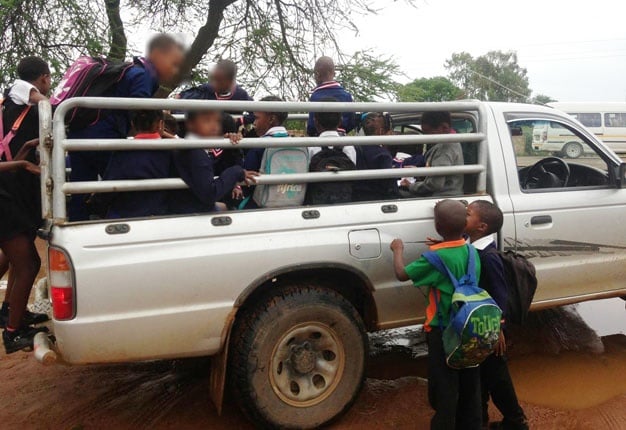
At the International Transport Forum (ITF) Summit, recently held in Germany earlier in May, the spotlight was put on Africa to combat what it called a "road safety crisis" after having found that only 2% of the world's cars are on the continent yet it accounts for 20% of the world's road deaths.
Clearly, something is very, very wrong. Even more alarming is the fact that children - especially those as pedestrians - make up a large portion of those killed in road crashes.
According to the FIA Foundation, as children grow older and gain more independence, road traffic injury becomes a"major threat to life and health".
The FIA Foundation for Automobile and Society says: "For boys, by the time they are adolescents, road crashes are the leading – and almost entirely preventable - global cause of death."
Its report reveals 227 000 children and adolescents (up to 19 years old) are killed on the world’s roads every year.
What do you think should be done to reduce children being killed in road crashes. Email us
Arrive Alive and Parent24 add their views later in the article.
The FIA foundation reveals that road traffic deaths are merely the tip of the iceberg:
Road safety - 'Children must be seen and not hurt' - Wheel Well
Road traffic injury is also now the fifth leading cause of death for children aged 5-14-years-old. For every death there is a life changing disability. For every disability, several serious injuries.
The FIA Foundations said: "As a result, the equivalent of two large schools are emptied of children every day. If this happened all in one place, on just one day, as the result of war or natural disaster or a firearms incident, it would be front page news. But because the pain is spread across continents, on daily repeat, this human catastrophe is normalised and hidden in plain sight."
Zoleka Mandela - The Biggest Killer Of Kids Is Not Disease Or Famine... It's Road Traffic
"More than 95% of children killed and injured on the road are from low- and middle-income countries. There are important regional variations: a child in Sub-Saharan Africa is twice as likely to be killed as his or her counterpart in the next most dangerous region, South-East Asia.
"But there is one constant - the most vulnerable road users in these countries are those outside of cars," says the Foundation.
"The majority of those killed are travelling as pedestrians, on bicycles, or as passengers on motorcycles or on unsafe forms of public transport."
Arrive Alive's Johan Jonck says: "Road crashes are one of the leading causes of deaths among our children. Children are our most vulnerable road users as their bodies have not fully developed and are at much larger risk in the event of blunt road trauma.
"We will continue to focus in our educational efforts on the child pedestrian, cyclist as well as the child passenger. Education is only one of the measures to assist our children in crossing roads, being visible and seen in traffic and always staying buckled in as passengers. We will also continue with messaging about the importance of slowing down near our schools and areas of pedestrian activity."
The FIA Foundations says that in high income countries, by comparison, a high proportion of children and adolescents are killed as car occupants. This reflects the fact that the car is the dominant mode, which has significantly reduced rates of walking and cycling by many children, and therefore exposure of those children as pedestrians.
Urban areas are also often safer and more walkable than their developing city counterparts. Some teenagers are prosperous enough to drive a car (sometimes from as young as 15) and are at much greater risk of killing themselves, their passengers, and other road users than are older and more experienced drivers.
Image: Wheels24 reader / Stephinah Segalagala
Parent24 editor Sophia Swanepoel says: "It is simply unacceptable that so many children die on South African roads. We need a big, countrywide campaign to teach everyone but especially our children to be safe pedestrians, and give them proper access to sidewalks, zebra crossings and foot bridges.
"Reflective school uniforms will also help a great deal on dark, foggy mornings. Secondly, we should insist on safe transport for our children, including road-worthy buses and taxis with seat belts, and car seats in family cars. Overall, we can be more patient, better mannered and take fewer chances, regardless of the attitudes of the drivers around us. It really can save a life!"
The FIA Foundation adds: "Paradoxically, young drivers often own or use the oldest and least safe cars. In many emerging markets, where motorisation is rising rapidly in the middle class and vehicle ownership is seen as a badge of success, vehicle safety is often substandard, with consumers treated as second-class citizens - by the same global car makers - compared with their counterparts in the OECD.
"Looking to the future, the continent combining a massive demographic boom in youth with the greatest potential for increased motorisation is Sub-Saharan Africa, where fatality rates are already the highest in the world, despite still relatively few cars."
Surveys show that, in African cities, between 70-90% of children walk to school, yet there are no sidewalks on more than 90% of roads combining pedestrians and fast traffic (moving at above 40km/h).
Avoiding a calamitous and costly collision of demography, motorisation, poor urban planning and bad governance in Sub-Saharan Africa must be a priority.




 Publications
Publications
 Partners
Partners
















